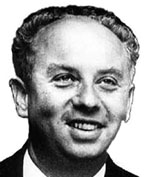Sinological Profiles
Timoteus Pokora
26 June 1928 (Brno) - 11 July 1985 (Prague)
Pokora's first field was law, which he studied at the University of Brno; he later shifted to Chinese at Charles University in Prague. His MA thesis topic was Wang Chung. After postgraduate studies at Peking University in 1956-1957, he returned to do a doctoral thesis on the less known Han philosopher Hwan Tan (043-28). Thus was the ground laid for a significant Sinological career. That career never occurred.
Pokora served as a research specialist at the Oriental Institute of the Czech Academy of Sciences, with a year out in 1965-1966 to lecture at Heidelberg. The Russian invasion of Czechoslovakia in 1968 resulted in his dismissal (along with that of all other scholars of consequence) from the Institute. He worked at Michigan in 1969 and 1970, whence the Michigan publication of his Hwan Tan study. Despite advice to the contrary, Pokora returned to Czechoslovakia and to a species of internal exile: able to live, but cut off from every sort of institutional Sinology. In these conditions, and with the further burden of increasing illness, he continued to use his mind as far as possible, and published where he could. A wry paper on "living corpses in early mediaeval China" appeared, as the first of his posthumous publications, in the year of his death, 1985.
In 1992, finally catching up with modern life and human decency, the Czechoslovak Academy of Sciences posthumously awarded Pokora "the Frantisek Palacký Memorial Gold Plaque of Merit for promoting Social Sciences." What Pokora promoted was both something more minute (he continued to examine the meaning of key terms such as jung/jvng, "impartial and just," in another posthumous article published in T'oung Pao in 1985) and also something larger: the human spirit.
What he and we were deprived of by the conditions of the last fifteen years of his life were his middle works. Chief among these was his intended full-length study of the contribution of Chu Shau-sun to the Shr Ji. Of this there is a tantalizing hint in the "impartial and just" article of 1985, and a longer sample in another posthumous paper of 1987, in which he openly referred to "my forthcoming book, Ch'u Shao-sun - the Third Author of the Shih Chi." The contemporary Shr Ji specialist Dorothee Schaab-Hanke made inquiries in Prague, only to be told that no trace of notes or manuscript for this project presently exists.
All due dishonor, and lasting scorn and disregard, to those who produced these lacunae in what would otherwise have been a major career.
E Bruce Brooks
References
- TImoteus Pokora. Is Chung-cheng = "l'Impartial et Juste"? A Philological Note. TP v71 (1985) 275-278.
- Timoteus Pokora. Shih Chi 127, the Symbiosis of Two Historians. in: Charles Le Blanc and Susan Blader (ed). Chinese Ideas About Nature and Society. Hong Kong (1987) 215-234. The opening words refer to the "forthcoming book Ch'u Shao-sun - the Third Author of the Shih chi."
- Robert P Kramers. In Memoriam Timoteus Pokora. TP v73 (1987) 1
- Josef Fass and Jiøí Síma with the assistance of Vladimír Lisèák. Timoteus Pokora: Bibliografie 1952-1987. Bibliographical Series of the Oriental Institute, v8 (1994). Contains a short biography by Jiøí Síma.
- Biography and Bibliography (in Czech)
Dorothee Schaab-Hanke contributed to this profile.
9 June 2004 / Contact The Project / Exit to Sinology Page
